The revered role of a football coach is arguably the most daunting task in sport.
It is a position requiring significant time and commitment, as well as a clear thinking mastermind.
Because being a professional coach is more than a full-time job – it’s a lifestyle.
Through the highs and lows of a football game, a coach must stay composed, communicate efficiently and ultimately become an analyst.
Jade Rawlings – the man at the helm of the Casey Demons VFL side – has those skills in spades.
There is never a dull moment in the life of a coach, with on-going preparation always required.
While coaches are often perceived as immortal figures who carry out a strict persona, Rawlings is a friendly, welcoming character and a nurturing family man.
Of course, Rawlings can’t carry the load of parenthood and coaching on his own, leaning on his partner Sallee for some trustworthy assistance. The pair balance their combined six children, as Rawlings organises teams both on and off the field.
With 22 men and a family to juggle, Rawlings has plenty on his mind as his Saturday morning kicks off prior to Casey’s round 10 clash with Collingwood.

The morning
In a sense, match-day is no different to any other for Rawlings, with tasks to be completed before leaving for work.
Although Casey is always at the forefront of his mind, he must firstly help organise his children and be a supportive father in multiple places at once.
After monitoring dancing classes and catching a glimpse of some representative football, the time comes for Rawlings to put his coach’s hat on and embark on his journey to the footy.
Arrival
It’s 11:35am and Rawlings pulls into Casey Fields.
With the game kicking off at 2:10pm, the senior coach has allowed himself plenty of time to settle in prior to the match.
The first task for the day is to head up stairs, jump on the laptop and do some final preparations for the pre-game address.
While not much phases the imposing figure, Rawlings does have a fussy side as seen when confronting the whiteboard. Not many coaches would spend time personally cleaning the board, but Rawlings goes to desperate measures to make it appear slick for his initial presentation. With different coloured markers and some neat hand writing, Rawlings ensures every word looks up to scratch.
Rawlings’ friendliness to all staff is notable, and after a relatively relaxing start to the day, the business side of things soon get underway.
Coaches meeting
The first of the pre-game meetings is between the coaches, taking place at 12:20pm.
For 15 minutes, the strategy refinement session involves some key discussion points, with different opinions being voiced.
The coaching team throw ideas out there and decide the best way to tackle different obstacles throughout the match.
A key skill Rawlings has is being able to see the game from others perspectives. He acknowledges how Collingwood will look to win the match, the motives of opposition players and the style of the Magpies game in recent weeks.
This strategic thinking allows Rawlings and his team to prepare for situations during the game and counterpunch any challenges as they occur.
In a game of football there are some unpredictability’s and uncontrollable moments, so Rawlings reiterates: “don’t be obsessed by things, just be aware.”
While the assistant coaches write away, Rawlings sits back in his chair with nothing in his hands – a theme which becomes notable as the day progresses. At no stage does Rawlings pick up a pen, write down a note, or refer to exterior paperwork. All of the knowledge is bottled up in his head with some incredible recollection of important events.
The final discussion between the coaches involves constructing a precise pre-game schedule – and that is strictly obeyed.
Players meeting
As the clock strikes 1pm, the players move in.
“You’ve got 10 seconds to sort yourselves into groups – backs, mids, forwards – go,” Rawlings says to start the meeting.
The players scramble to find a seat, with Dom Tyson dramatically falling to the ground as the clock winds down.
While this initial activity gets the players laughing and bonding, it is aimed to reflect a defensive 50 stoppage, where every individual on the field is required to help set-up; quickly.
Rawlings’ presentation to the players has a common theme – ‘choose your attitude’.
On a weekend where Neale Daniher has inspired so many, Rawlings insists the key to victory is playing as a team, respecting the opposition and having the right approach to the game.
A five-minute video is now played, highlighting all the gutsy moments from Casey’s previous victory against Williamstown, with the words ‘choose your attitude’ displayed again.
With the 1998 Springvale Scorpions side reminiscing its premiership in the next room, Rawlings’ last words are: “When you move on you’re a long time retired. The hard work now will be something to celebrate later.”
To close the meeting on a high, Marty Dobson takes centre stage. The bubbly figure is a devoted worker behind the scenes and a much loved character among the group. With a beaming smile, Dobson recaps the week gone by and helps send the players into motion with a burst of his contagious energy.
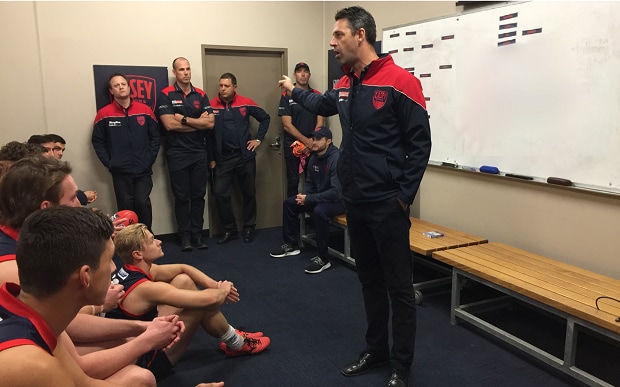
Final preparations
While the players go through their routines and prepare for the match, it becomes a waiting game for Rawlings.
The coach doesn’t like to impede on his players as they prepare, but he offers some words of encouragement when walking around the rooms.
There is a notable vibe of elation, with players buzzing around in the warm-up, but that isn’t enough to convince Rawlings a victory is on the cards. The head coach is adamant there is often little correlation between excitement and performance, with his final message still to be conveyed.
At precisely 1:52pm, just five minutes prior to the players running out on the field, the closing address begins.
Rawlings hammers home his key points, instructing his players and ensuring they don’t miss the jump.

The coaches box
With five people at the desk and three standing at the back, the box isn’t as spacious as one may suspect.
Six laptops are used to display stats and vision, while there are note pads and phones galore.
It may appear chaotic, yet there’s method to the madness and everything runs smoothly.
As the first ball is bounced, Rawlings takes his seat with a prime position on the wing.
The coaches begin to announce Collingwood’s structural moves to ensure they can cover anything unexpected and the play-by-play discussion evolves.
Code words are yelled out, with the coaches speaking a language of their own to analyse the contest.
While every kick, tackle and bump is acknowledged, the coaches do more than just follow the footy.
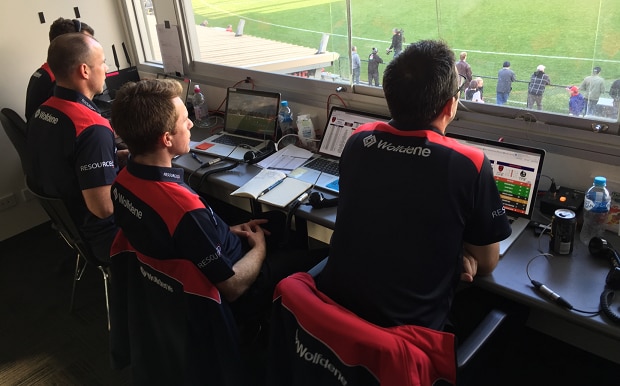
Rotations
With an entire team to organise, one of the standout focuses is the interchange and positional rotations.
While there is one person in charge of monitoring every move, the coaches have their say on where the players should be heading.
A common external criticism of football is that a player shouldn’t go off after kicking a goal.
But after spending time in the box, the reasoning becomes clearer.
The level of work required to organise a football team is unimaginable, with every interchange pre-planned and designed to get the utmost out of all players for the longest possible time.
If one player misses his rotation, it can throw the entire team balance out of whack, thus the importance of the constant discussion.
As the quarter-time siren sounds, Rawlings continues to plan the rotations for the second-term while making his way onto the field and adjusting the magnets.
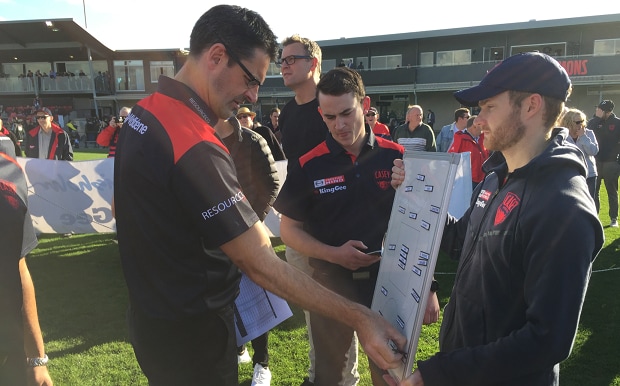
Inside the huddle
There are undoubtedly moments throughout a game which frustrate a coach.
A sporting contest never goes to script and mistakes cause outbursts which are well felt in the box.
But Rawlings’ ability to leave his worries behind and form a motivational speech during the break is something special.
Instead of dwelling on the disappointments of what wasn’t executed, Rawlings has learned to use those moments to teach his players how to improve.
In the limited time that a coach has to speak to his side, the most valuable messages must be transferred.
Rawlings reiterates the importance of the fundamentals and uses the flaws in Casey’s game to encourage improvement for the next term.
After some positive reinforcement, the Demons break away from the huddle ready to implement the tactics addressed.
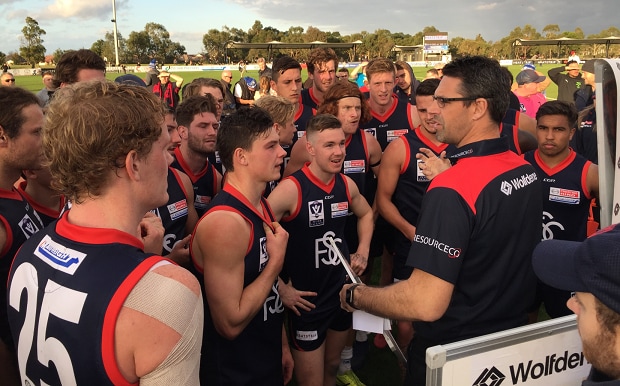
Analysing vision
As the game unfolds, Rawlings sees things he likes; and things he doesn’t.
If Collingwood pierces the defence, or a structure loses unification, Rawlings refers to the footage to see what went wrong.
This allows the coaching group to make immediate fixes during a quarter of the game.
Another benefit of having vision on hand – a luxury only available for the home side in the VFL – is the ability to show players footage at half-time.
Throughout the first half, Rawlings calls out when he would like a passage of play clipped and reflects on that example during the main break.
The half-time address
As the player’s pour into the rooms and begin to recover, Rawlings prepares for his speech.
He has a quick discussion with Melbourne coach Simon Goodwin, before reviewing the selected footage to determine what will be a valuable teaching tool in the context of the game.
With the opportunity to address his troops, Rawlings rolls the tape, showing how things came unstuck in the second term.
Despite some disappointment in the team’s performance during the previous quarter, Rawlings remains positive.
He knows how to get the best out of his players, delivering a message to help them get back on top.
As the players rise for the second half, Rawlings leaves them with the recurring message: “Choose your attitude. Think and care about someone else.”
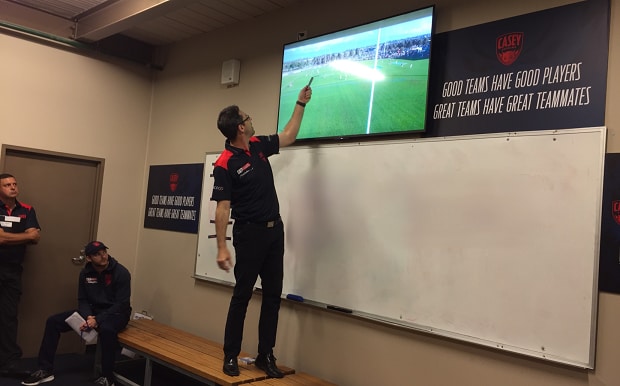
Communication
As the second half plays out, the communication between coaches becomes a crucial factor in helping the Demons succeed.
Rawlings shows an incredible trust in his fellow staff members, leaning on everyone around him to help make the team work.
During the game, coaches yell out various observations including stats, match-ups and structures, with Rawlings voicing his opinion on what needs to change.
Another vital element of communication occurs over the phone, with a direct line to the interchange bench.
All of the coaches have the opportunity to talk to the players during the match, whether that be some words of encouragement or a rather direct message.
But Rawlings is particularly aware of how to interact with different players.
The most important quality of a coach is being able to develop relationships with people and understand who they are, the way they operate and how they respond.
While sometimes the voice is raised, Rawlings tailors his communication to the individual, talking to his players over the phone and at the three-quarter time huddle to help guide his side home.

Review
After a 23-point victory over Collingwood and a fifth win on the trot, the Demons belt out the song, with Rawlings watching on in pride.
As the players enter the meeting room for the post-game review, they hug and high-five their coach with joy.
An essential aspect of coaching is gaining the respect of your players, and the Casey boys hold nothing but admiration for Rawlings.
Living off every word he says, the players engage with Rawlings and listen carefully to his advice.
Although Casey’s performance wasn’t of the highest standard during the match, Rawlings says the wins when you’re flat are the most important wins of all.
While Rawlings points out some of the most influential players, he acknowledges the value of the team effort, with contributions from each of his soldiers – lifting the esteem of everyone in the room.
After a brief interruption from the ringing of Tim Smith’s phone, Rawlings resumes to congratulate his side and encourage them to enjoy the success of their efforts.
Coaches meeting
As the players wind down, doing their stretches and pumping the celebratory tunes, the work continues for the coaching group.
The final meeting for the day is rather mellow, with the coaches discussing what worked, what didn’t, and how they can improve.
Different moments from the match are recalled, while they touch on incidents that can be showed to players.
After some analysing of stats and voting for best players, Rawlings’ last chore each week is to chat to the media, before finally relaxing after a long day at the office.
Wrapping-up
The hard work is done, but it’s not home time just yet.
After a draining day for Rawlings and all involved, he believes one of the most important aspects of football is enjoying the successes.
The players and coaches remain at the club for up to an hour after the formalities are complete, reminiscing on the afternoon and forecasting what’s to come.
When the day is finally complete, Rawlings ventures home.
But due to the demanding nature of the role, Rawlings prepares to wake up the next morning and review the match, with the on-going cycle of football continuing for the devoted Demons coach.


